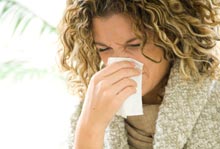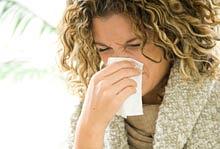Ten tips help prevent winter colds
The common cold is an infection of the upper respiratory tract caused by a virus. There are over 200 viruses that cause colds; the most common is the rhinovirus. Colds are a major cause of lost work and school days, and doctor visits. Children are most susceptible to contracting the virus and may experience as many as 10 colds a year. As we get older, we develop immunity to many viruses and are less likely to get colds.
Colds are highly contagious. The virus enters your body through your nose or mouth. For example, if you are beside someone who has the virus and coughs or sneezes and you inhale those virus droplets then you can “catch” a cold. It can also be spread by hand to hand contact or touching an object that has been contaminated with the virus and then rubbing your eyes, nose or mouth.
A healthy functioning immune system is your best defense against a cold. If you catch a cold, there are a variety of lifestyle measures and supplements that can help speed healing and improve symptoms.
Is it a cold or flu?
These infections are caused by different types of viruses however they do share some common symptoms: aching, weakness, sore throat, and congestion. Here is where they differ: the flu causes a sudden onset of severe aching, pain, headache and high fever (102 to 104 F). Colds develop more slowly, don’t usually cause fever, and only cause mild aching and fatigue.
Ten Tips for Prevention
1. Wash your hands regularly - soap and water or hand sanitizer. This is the best way to prevent the spread of viruses.
2. Eat lots of fruits and vegetables - these foods are loaded with vitamin and minerals which support immune system function.
3. Minimize sugar and refined starches - these foods hamper immune response.
4. Drink plenty of fluids - to help the body eliminate toxins and prevent dehydration (dry mucus membranes can make it easier for viruses to enter).
5. Don't smoke and avoid second-hand smoke. Smoke damages mucus membranes in nose, throat and esophagus making it easy for viruses to invade the body.
6. Minimize alcohol - alcohol is hard on the liver - our key detoxifying organ - and it is dehydrating.
7. Relax and de-stress yourself - stress can hamper immune function.
8. Get regular, moderate-intensity exercise - it helps boost our immune response.
9. Ensure adequate sleep - proper rest is essential for immune health.
10. Take immune boosting supplements, such as vitamin C, aged garlic extract and Echinacea. See the list below for more details.
Internet site reference: http://www.sherrytorkos.com
Comments
There are 0 comments on this post













